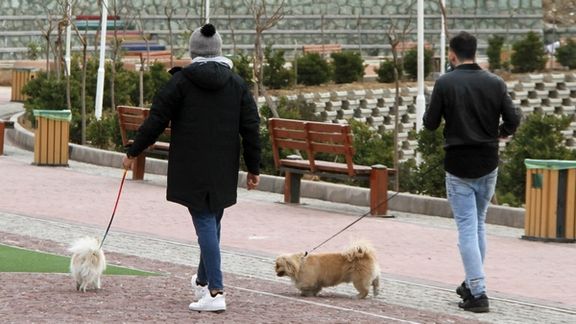Iran's Hardliners Threaten Renewed War On Man's Best Friend

The Tehran municipality has grown increasingly critical of dogs, signaling that the authorities' snarls are a prelude to an impending crackdown on man's best friend.

The Tehran municipality has grown increasingly critical of dogs, signaling that the authorities' snarls are a prelude to an impending crackdown on man's best friend.
In a renewed campaign against dog ownership, Tehran Mayor Alireza Zakani said this week, “Dog-walking in the city is very wrong and illegal, especially when done without rules and regulations. Legal authorities must intervene and change the culture in such a way that if someone wants to walk a dog, they do it by the rules.” Zakani's deputy, Hossein Nazari, described dog walking as one of "challenges" for the capital.
The religious regime views keeping dogs as a symbol of Westernization that can be dangerous and should be prohibited. Dogs are generally considered 'najis' or 'impure' in Islam and banned in public places by some majority-Muslim countries including Saudi Arabia. Iranian parliamentarians proposed a bill last year banning selling and keeping of pets, claiming that the ban was meant to protect public health. While working dogs have always been common in Iran’s rural areas and on farms, keeping pets has only recently become fashionable in urban areas despite occasional police crackdowns.
Several of the growing number of dog owners in the capital shared their grievances with Iran International, detailing their persistent conflict with authorities and religious individuals subscribing to the Islamic Republic’s rancorous views on dogs.
The owner of Snow, a black terrier mix, said she consistently faces objections from neighbors when walking her dog in the green areas of their apartment complex in northern Tehran. Non-dog-owning residents argue that dogs should be prohibited in common areas, citing concerns about their children playing there. She added that the situation escalates on the streets, highlighting instances where her friends received fines for having their dogs in cars outside designated boxes.

The issue extends beyond communal building areas, as experienced by Toffee's owner, who has an apricot toy poodle. Residing in a central Tehran neighborhood with a conservative social context, she faced persistent harassment from neighbors, ultimately prompting her to move. Her religious neighbors were intolerant of having a dog in the building, continually threatening to file a lawsuit for her eviction, she said.
In the absence of specific regulations regarding dogs, authorities employ alternative measures to exert pressure on dog owners, primarily through laws governing shared spaces within buildings. These regulations imply that owning and keeping animals, including dogs, in communal areas is prohibited. The Islamic Penal Code, particularly Article 688, reinforces this prohibition by penalizing actions deemed threatening to public health, citing potential health risks associated with the possession of dogs. Violations may result in legal consequences, as neighbors have the ability to file complaints against such practices.

The owner of Woody, a golden cocker spaniel, said she faces crippling stress whenever she tries to take Woody for walks, adding that the recent warnings from the authorities have made the situation even more stressful. “Dogs have no rights in Iran,” she lamented, referring to a lack of clear regulations on where dogs are permitted.
The absence of clear regulations also leads to other legal challenges, as seen in the case of Leo's owner, who lost her dog due to veterinarian malpractice. Recounting her experience, she said, "I attempted to seek legal action for my lost dog, but I was advised not to waste my time and energy as it would be futile." She pointed out, "Even human beings struggle to find justice in Iran, let alone the poor dogs."

Earlier in the year, a real estate agency was sealed off and its owner arrested after a video went viral of the property agency transferring the ownership of an apartment to a dog. The footage showed an Iranian couple signing a contract transferring the title of their apartment to their small furry white dog Chester. Iran’s police and Tehran’s deputy prosecutor Reza Tabar mentioned “issuing an invalid contract for an apartment unit” as the reason behind the arrest. Without elaborating on the legal grounds, Tabar said “this action is illegal and was meant to demean the norms of society.”
While officials such as the mayor of Tehran argue for the need to regulate dog ownership, implementing effective laws presents a significant quandary. Crafting regulations would inadvertently entail granting certain freedoms to dogs and their owners, such as allocating designated areas or parks for walks – a prospect that contradicts the state's ideological stance.
The proposed legislation, which was never followed up and labeled as a waste of parliament’s time, envisaged a monetary fine ranging from $900 to $2,700, along with the possibility of impounding the animal. Additionally, real estate agents would be required to prohibit dogs in rental agreements within three months of the law's enactment, with corresponding fines for non-compliance. Individuals walking their pets in the street could potentially face a three-month jail term, or if driving with their dog, the confiscation of their car for three months.
Previous attempts to address the issue involved police campaigns rounding up dogs and their owners, serving as more of an intimidation tactic than a systematic solution. One major impediment to enforcement is the lack of proper facilities to accommodate detained dogs. With no dedicated spaces to house them and a shortage of personnel to care for the animals, the authorities face a logistical dilemma in cracking down on dog owners.
The recurrent conflict surrounding dog ownership tends to resurface intermittently but often becomes overshadowed by popular protests on broader human rights issues or economic challenges. The government's persistent struggle to regulate dog ownership represents another intrusion into citizens' private lives, adding to a myriad of existing bans, including restrictions on alcohol consumption, dating, public appearances without "proper hijab" for women, mixed-gender parties, and singing by women.